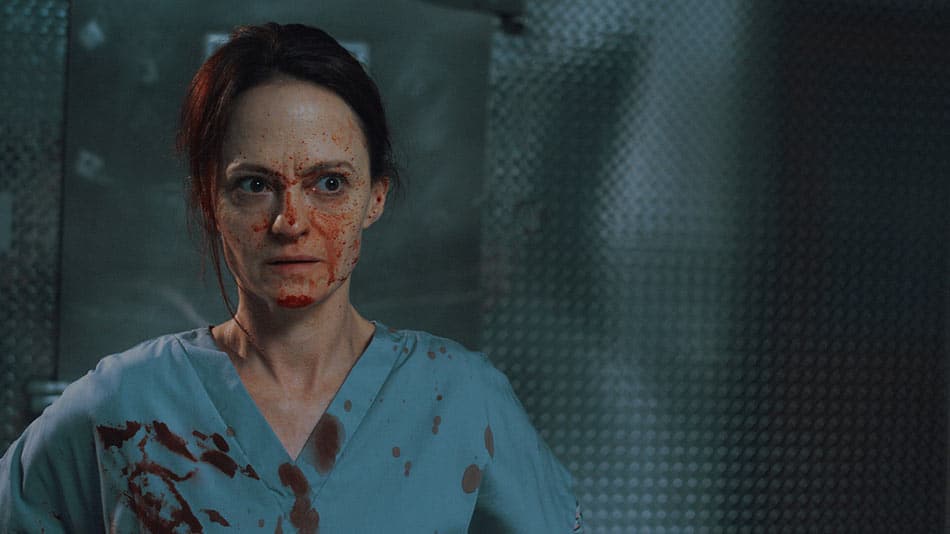
This Halloween season is a lot different from previous years, because of the pandemic, but one thing that hasn’t changed is the abundance of new horror films being released. Between Timothy Woodward Jr.’s The Call, Jim Cummings’ The Wolf of Snow Hollow, Thomas Robert Lee’s The Curse of Aubrey Earnshaw and Blumhouse’s Evil Eye & Black Box there is something for everyone, whether it be a werewolf tale or a classic possession story. Another film worth taking a look at is Brea Grant’s 12 Hour Shift. While the film isn’t as terrifying as some of the pervious titles mentioned, its gruesome, black comedy nature makes for a wild ride. Plus, it stars horror icons Angela Bettis (May) and David Arquette (Scream franchise). Since the sound in horror projects plays such a crucial role, we decided to speak with the film’s supervising sound editor and re-recording mixer Jacob Bloomfield-Misrach. Below he gives an inside look at his job and the sound process for 12 Hour Shift.
-Why do you think horror fans will enjoy watching 12 Hour Shift?
12 Hour Shift is completely entertaining. Some horror films aim for the most traumatic scare possible, but 12 Hr is a really fun ride. It’s bloody when it needs to be, but it’s not afraid to have a good time. The music is awesome and the actors are great. It also happens to be based on a true story.
-What objects do you think sounded the creepiest in 12 Hour Shift?
The use of opera singers in the score was brilliant. It adds a whole other dimension of creepiness to the film. Matt Glass did a great job with that. Also, someone gets stabbed in the eye with a syringe. That grossed me out pretty good.
-As a supervising sound editor, do you work very closely with the project’s composer? In this case Matt Glass. If so, what does your working relationship look like?
Yeah, we’re buds when working on a film together. My job is to support and highlight all the awesome music he writes, while at the same time making sure that it doesn’t get in the way of the dialogue. Generally, I’ll dial in the music to where I think it should sit, and then the composer will come in with feedback about certain scenes that need to push the music a little harder.
-How much does the setting impact your job? Does a quieter setting (like a hospital at night), make your job more complicated or easy?
Miles Davis used to say that a ballad is the hardest thing to play. That’s because it’s hard to make “space” sound good. Same thing for a quiet film. Sometimes it’s easier to make a whole bunch of explosions sound better than an empty hospital. Every sound in the film becomes exposed and vulnerable when it’s quiet. It’s a different type of challenge.
-What would you say was the most challenging part of your job for 12 Hour Shift?
Cutting in footsteps for the dance number was tough. The music changed after they shot the scene. So, it took a bit of manipulation to get everything to fit together. But got it working in the end.
-Are there horror films in the last few years that the sound has particularly stuck out to you?
Stranger Things is an obvious winner from the last couple of years. The did a great job with the sound design on that.
-To give audiences an example of what exactly you do. So the film The Quiet Place heavily relied on the Supervising Sound Editor and Re-Recording Mixer because there was so little dialogue? If you would have been working on that film, you would have been in charge of a lot of what we heard?
Yup. Basically, my job is as the team captain. I have a group of sound designers and dialogue editors that work for me, and we decide as a group how to make a film sound as amazing as possible. Then, as the re-recording mixer I put all of the pieces together. A film like A Quiet Place is a great example of sound design. So much subtlety went into it being quiet and yet consistently suspenseful.
-You are also a composer. What type of horror film would you enjoy scoring given the opportunity?
Great question. I find something compelling in every film I score. And honestly, I’d love to branch out into more horror music writing. So if you know anyone looking for a composer, hit me up! In terms of a hypothetical horror film, if someone were to do a remake of Beetlejuice, but in a more realistic and gruesome way, I think that could be awesome, and also a ton of fun to write music for.


